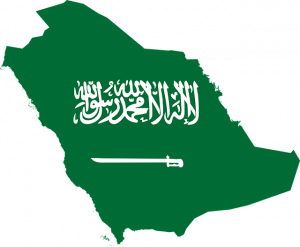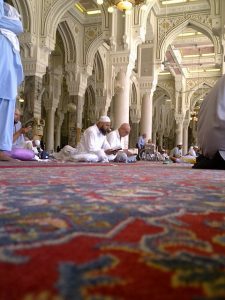A Saudi Arabian young man who was accepted to be a student at Western Michigan University is now facing imminent beheading in his home country.
PUBLISHED ON 21 July, 2017 BY Lyndsey Koh

Saudi Arabian flag overlay on the country’s map.
Saudi Arabia (MNN) —Mujtaba al-Sweikat was arrested back in 2012 at a Saudi airport on his way to the United States for his education at WMU. At the time, he was 17-years-old and charged with participation in pro-democracy protests. But his execution sentence was given recently and his case has once again drawn international attention. Thirteen other minority Shiites are facing the same fate as well.
After the recent sentencing, Mujtaba and the others were transferred to a prison in Riyadh where Saudi Arabia routinely carries out their executions. A lot of human rights groups and a large U.S. teacher’s union are getting involved, calling on President Trump to intervene and stay Mujtaba’s execution.
Tom Doyle with e3 Partners and author of “Standing in the Fire” says, “For many people it’s shocking, but it is not surprising. I think the reason it’s getting news coverage, of course, is that this was a potential student in America, so it certainly splashes on the headlines. But this is normal, this is business as usual in Saudi Arabia.
“I wrote in the book ‘Dreams and Visions’ about those that go to Mecca to make the Hajj, and there are executioners that stand by. If there’s any kind of violations or anything that might be against Islamic law, then those people are dragged off and they’re beheaded. So there’s no court case. There’s no innocent until proven guilty.”

Muslims in a mosque in Saudi Arabia.
And although Mujtaba isn’t facing execution for religious purposes, this case definitely reflects on Saudi Arabia’s overall approach to human rights issues, including religious freedom.
“It’s very easy for a country like Saudi Arabia or Iran to classify something that they consider a crime as a crime against the government. So, easily that could be classified with a religious conversion.” And this is often the case in Saudi Arabia. When a Muslim converts to Christianity and their family finds out, the family will often retaliate and take their life. But if they don’t, the government often will.
The situation can seem dire, even hopeless. But Saudi Arabia can’t limit the Holy Spirit with their laws, and Doyle sees how God is moving there.
“There are even Christian broadcasts that go into Mecca and Medina and there have been texts and emails sent out — very dangerous for the person to do that — to say, ‘We have believers here in Mecca. Pray for us.’”
Ultimately, he says, “We do know that the Gospel is not prohibited. It’s never passive, it never takes a break, and Jesus said it would bust through the gates of hell. We’re seeing believers in Saudi Arabia, even in places like Mecca and Medina! So we’ve got to pray for our brothers and sisters in Christ for sure.”
Please also pray for Mujtaba and the other minority Shiites facing execution, that their lives would be spared and, if they do not know Christ, that they might come to know Him as their Savior.
Doyle also adds this reminder: “I would just encourage the listeners of Mission Network News, when you see a story that’s Saudi Arabia or Iran or North Korea, just remember there are brothers and sisters in Christ living there and they are in some of the most dangerous places in the world, and we need to pray for them. Please pray for them. So use the news as a spiritual experience to really prompt us to pray for the Body of Christ.”
